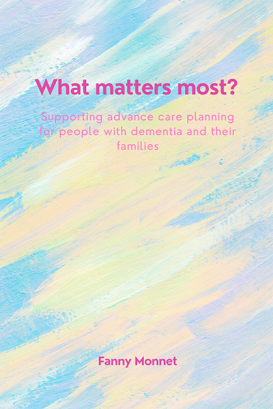Author: Fanny Monnet
Date: 19-04-2024
Supervisor:
Prof. Lieve Van den Block, End-of-Life Care Research Group, Faculty of Medicine & Pharmacy, Vrije Universiteit Brussel
Co-supervisor:
Prof. Lara Pivodic, End-of-Life Care Research Group, Faculty of Medicine & Pharmacy, Vrije Universiteit Brussel
Abstract
Advance care planning (ACP) helps to explore the values, goals and preferences of a person for his/her future health care. It can facilitate making decisions when a person is no longer able to express his/her wishes. ACP is very relevant for people with dementia and those close to them, however, many find it difficult to engage in. They might not feel ready or know how to initiate the conversation or lack information about what ACP is.
First, this dissertation gives insight into current definitions of ACP and provides recommendations from the perspectives of people with dementia and their families. Secondly, it presents the development and testing of an ACP support website, developed with and for people with dementia using a user-centred evidence-based design.
The dissertation also provides an overview of two web-based reflection and communication tools created within the ACP support website and report on the evaluation of these two tools.
Finally, this provides recommendations for future web-based tools targeting communication and decision-making for people with dementia.
The results of this work show that a ‘what matters most’ and a combined person-centred and family-focused approach to ACP could be appropriate to support people with dementia and family caregivers in ACP.
Following this approach, an ACP support website, which provides ACP information and support to start ACP conversations, and two webbased reflection and communication tools were developed. They were deemed helpful and user-friendly by people with dementia and family caregivers.
However, people with dementia faced some difficulties in using the website and family caregivers played a crucial role in facilitating their use of the ACP support website.
Based on the findings, implications for practice, policy and future research are provided.


